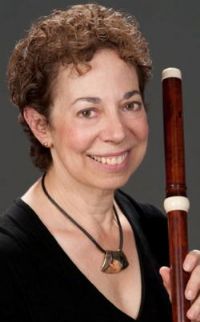|
Symphony
FROM THE NEW WORLD TO THE OLD WORLD
by Peter Lert
Saturday, June 14, 2025
Chamber
MC2 DUO RECITAL CLOSES 222'S SEASON
by Terry McNeill
Saturday, June 14, 2025
Choral and Vocal
CANTIAMO SONOMA'S LUSCIOUS A CAPELLA SINGING IN SEASON ENDING CONCERT
by Pamela Hicks Gailey
Sunday, June 8, 2025
Symphony
SRS SEASON ENDS WITH RESOUNDING TA-TA-TA-BANG
by Terry McNeill
Sunday, June 1, 2025
Symphony
YOUTHFUL VIRTUOSITY ON DISPLAY AT USO'S MAY CONCERTS
by Peter Lert
Saturday, May 17, 2025
Symphony
MYSTICAL PLANETS AND LIVELY GERSHWIN ORTIZ AT FINAL SRS CONCERT
by Peter Lert
Sunday, May 4, 2025
Symphony
VSO'S CONCERT MUSIC OF TIME, MUSIC OF PLACE
by Peter Lert
Sunday, April 27, 2025
VOCAL ELEGANCE AND FIRE AT THE 222'S RECITAL APRIL 26
by Pamela Hicks Gailey
Saturday, April 26, 2025
CANTIAMO SONOMA SINGS AN INSPIRED GOOD FRIDAY MOZART REQUIEM CONCERT
by Pamela Hicks Gailey
Friday, April 18, 2025
DRAMATIC SHOSTAKOVICH SYMPHONY CLOSES PHILHARMONIC'S 25TH SEASON
by Terry McNeill
Sunday, April 13, 2025
|
 |
 Flutist Sandra Miller |
PERFECT BACH IN BELVEDERE
by Terry McNeill
Friday, January 24, 2014
Perfection in classical concert performance is a tough job, especially on a consistent basis. The redoubtable American Bach Soloists (ABS), however, manage to reach musical perfection often, and they did it again Jan. 24 in a sterling event in Belvedere's St. Stephen's Church.
Beginning their 25th season, and before a full house of 285, music director Jeffrey Thomas fashioned a long Bach program: two Cantatas, the B Minor Orchestral Suite and the wonderful Magnificat, BWV 1733. Before Cantata 214 Tönet. Ihr Pauken! Erschallet, Trompeten! Mr. Thomas addressed the audience, praising their many decades of support and introducing four orchestra and three audience members who had been with the ABS since its 1989 inception in the same church. Five hundred musicians and singers had been ABS performers during the period.
The first cantata was joyous, the baroque trumpets (stationed stage left outside the violins) announcing the theme in the famously dry but mostly clear St. Stephen's acoustics. All through the Cantata the continuo line by harpsichordist Cory Jamason, cellist William Skeen and violone-grossist Steven Lehning were easily heard. In the lighter textured third section, soprano Clara Rottsolk sang a lovely florid line with flutist Sandra Miller.
Countertenor Eric Jurenas sang the difficult fifth section aria in a duet with oboist John Abberger, and later sections featured baritone William Sharp. Mr. Jurenas' flashy long runs with equally long breaths were exciting, and Mr. Sharp's voice often became an animated herald with bits of histrionics and then slow dignity.
The First Orchestral Suite (BWV 1067), which closed the first half, is not quite a concerto for flute, but after experiencing Sandra Miller's artistry, the term "virtuoso flute concerto" is apt. Baroque flutes are less shrill and loud than a transverse flute, and Ms. Miller played with a silken tone throughout the seven short movements. The violins, using minimal or zero vibrato, often take tones from slightly above pitch, adding to the pungent harmonic mix. In the stately Polonaise Lentement march movement, Ms. Miller's control of long lines, mordents and octave skips was masterful, especially so in duets with Mr. Skeen and Mr. Jamason. The finale found the flute mostly in the high register; the expressive music had quick down and up four-note phrases that could be likened to a horse trot. Mr. Thomas as usual had these forces in balance and under expert control.
Cantata No. 130, Herr Gott, dich loben alle wir, began majestically with Mr. Thomas underscoring the off-beat accents and moving it at a fast clip. Excellent playing and singing continued into the third section (Mr. Sharp's snazzy long phrases but muddy trumpet playing in ascending scales), Mr. Cutting's suave singing and a lovely slow dance in the fifth part. Here the conductor held his arms at his side and presumably reveled in the quartet sound of flute, cello, organ and violone grosso pizzicato. It was captivating and a highlight of the evening. The penultimate chorus included an audience sing-along with the familiar "For this we give the willing praise" (Praise God for whom).
The 30-minute Magnificat closed the concert. Here the 22-voice chorus was superb, blending with the instruments and supplying a beautiful soprano-mezzo soprano duet lament with a mournful oboe solo in the third section. Mr. Thomas commanded many subtle crescendos. Of note throughout the work were Mr. Sharp's fioratura and perfect scales, an aching musical cry in a tenor and countertenor duet, and a surprising fugue for just the chorus and organ just before the finale.
This was musical perfection for Bach, augmented by the many small but important things the ABS does so well: personal names printed on tickets, a lavish printed program crammed with information and a refreshing lack of puffery, and the now legendary gratis intermission buffet in the architecturally stylish parish hall. It was a Bach concert that was in every way impeccable.
Early music performer and critic Joanna Bramel Young attended the ABS concert and her comments are posted in the Article section of Classical Sonoma
|

